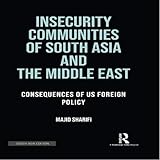Insecurity communities of South Asia and the Middle East : consequences of US foreign policy / Majid Sharifi.
By: Sharifi, Majid [author.].
Publisher: New York : Routledge , 2021Description: ix, 286p.ISBN: 9781032045962.Subject(s): Political stability -- South Asia | Political stability -- Middle East | Regime change -- South Asia | Regime change -- Middle EastDDC classification: 320.954| Item type | Current location | Call number | Status | Date due | Barcode |
|---|---|---|---|---|---|
 Books
Books
|
NASSDOC Library | 320.954 SHA-I (Browse shelf) | Available | 53100 |
Includes bibliographical references and index.
Part I: The making of insecurity communities -- Introduction -- Conceptualizing insecurity as a regional phenomenon -- Part II: Insecurity communities of Afghanistan and Pakistan -- Afghanistan and Pakistan as regional insecurity communities -- 2001 regime change in Afghanistan -- Part III: Insecurity communities of the Persian Gulf -- A brief history of US-led state-building in the Persian Gulf Region -- Shifting alliances in the Persian Gulf -- Consequences of the First Gulf War -- US-Iran relations post 9/11 -- Part IV: Insecurity communities of Iraq and Syria -- The rise of Iraq's Ba'ath Party -- Consequences of the 2003 regime change in Iraq -- Fragmentation of Iraq -- Conclusion.
"This book critically examines how US foreign policy has produced a regional regime of instability and insecurity in South Asia and the Middle East. It focuses on three interconnected zones of conflict - Afghanistan and Pakistan in South Asia, Iran and the Persian Gulf states, and Iraq and its neighbours. In a comprehensive historical survey, this work compares the governing behaviour of these states with that of the West, where the American Foreign Policy Establishment has, in contrast, pushed for investing in collective security. The author studies various events throughout history such as the Taliban regime; the US led war in Afghanistan; Obama administration and Pakistan; Kuwait and Iraq war; the Arab Spring, and the rise of ISIS, to present a theoretical analysis of Washington's consistent pursuit of multibalancing and regime change wars in the region. An important critical assessment of Western foreign policies, this book will be indispensable for students and researchers of US foreign policy, defence and security studies, strategic affairs, politics and international relations, political economy, nation-state building, identity studies, globalization studies, Middle East studies, and South Asian studies"--


There are no comments for this item.